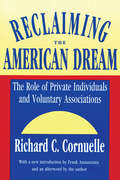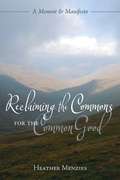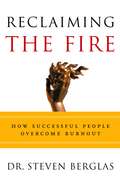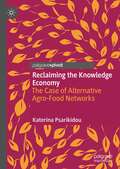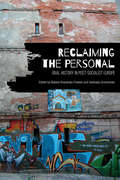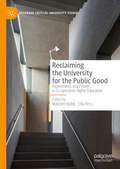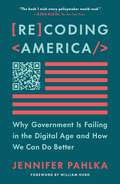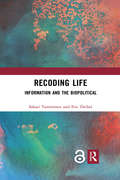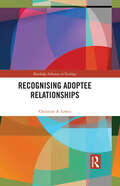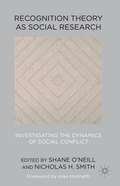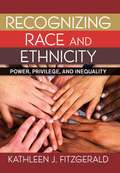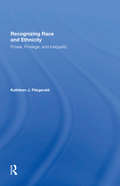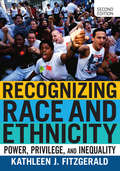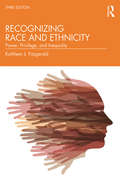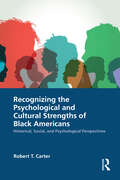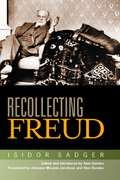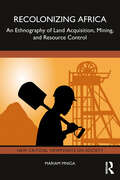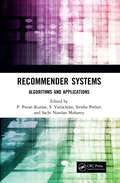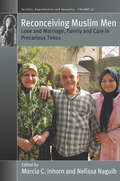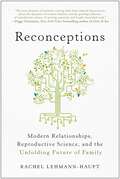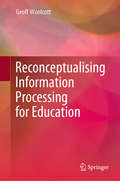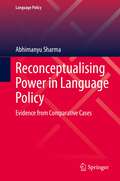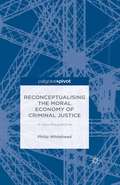- Table View
- List View
Reclaiming the American Dream: The Role of Private Individuals and Voluntary Associations (Philanthropy And Society Ser.)
by Richard C. CornuelleThis book was the first to sketch the full dimensions of the nation's voluntary sector, give it a name (the independent sector), explain its unfamiliar metabolism, and imagine its enormous unused potential for defining the central problems of an industrial society accurately and acting on them effectively. Upon publication, George Gallup said the book has sparked "the most dramatic shift in American thinking since the New Deal."
Reclaiming the Commons for the Common Good
by Heather MenziesCommoning was a way of life for most of our ancestors. In Reclaiming the Commons for the Common Good, author Heather Menzies journeys to her roots in the Scottish Highlands, where her family lived in direct relation with the land since before recorded time.Beginning with an intimate account of unearthing the heritage of the commons and the real tragedy of its loss, Menzies offers a detailed description of the self-organizing, self-governing, and self-informing principles of this nearly forgotten way of life, including its spiritual practices and traditions. She then identifies pivotal commons practices that could be usefully revived today. A final "manifesto" section pulls these facets together into a unified vision for reclaiming the commons, drawing a number of current popular initiatives into the commoning frame, such as local food security, permaculture, and the Occupy Movement.An engaging memoir of personal and political discovery, Reclaiming the Commons for the Common Good combines moving reflections on our common heritage with a contemporary call to action, individually and collectively; locally and globally. Readers will be inspired by the book's vision of reviving the commons ethos of empathy and mutual respect, and energized by her practical suggestions for connection people and place for the common good.Heather Menzies is an award-winning writer and scholar and member of the Order of Canada. She is the author of nine books, including Whose Brave New World? and No Time.
Reclaiming the Fire: How Successful People Overcome Burnout
by Steven BerglasThe definitive work on avoiding burnout, written by the psychologist who is the leading specialist on the issue. An illuminating and useful book for anyone coping with the pressures of work.In Reclaiming the Fire, Dr. Steven Berglas analyzes the rises and falls of corporate executives, middle managers, lawyers, entrepreneurs, and others as they struggle to handle the trappings of successful careers. How does one deal with encore anxiety, the monotony of having to use talents that are no longer psychologically rewarding? Why is it that our national obsession with wealth traps people in careers that often lead them to wonder, "Is that all there is?" And why do highly successful people often set themselves up for disastrous falls?Dr. Berglas answers all these questions and many more in this groundbreaking book by discussing real people whose careers have left them feeling pressured, burdened, and jaded.In his most progressive and striking contribution to the literature on career success, Dr. Berglas debunks the persistent myth that women suffer more stress and burnout than men. He disproves the common claim that women involved both in careers and in family life suffer from trying to have it all, and he demonstrates how the drive to form close interpersonal ties a drive that is intrinsic to women can actually prevent both men and women from experiencing burnout. In a related analysis of the mentoring process, Dr. Berglas shows why it is more important for careerists to build legacies for future generations (a process he terms generativity) than to become obsessed with their own personal success. He proves that the process not only benefits the student but provides the mentor with psychological satisfaction and even improved physical health.Reclaiming the Fire uses the working world not the psychiatric couch as a venue for understanding the psychological and emotional burdens of success. It is the first comprehensive account of how to balance self-esteem and ambition while maintaining challenge and stimulation throughout your career. Reclaiming the Fire provides insight into: * Why baby boomers are currently suffering an epidemic of career dissatisfaction * Why women are uniquely suited to cope with the pressures that cause men to suffer burnout, and what men can learn from them * How to escape golden handcuffs: the workaholic devotion to a job that is no longer emotionally satisfying * How to cope with anger that threatens to sabotage your career * How all professionals can identify the passions that will allow them to sustain and enjoy success throughout their lives.
Reclaiming the Knowledge Economy: The Case of Alternative Agro-Food Networks
by Katerina PsarikidouThis book offers a critical analysis of the diverse knowledge and knowledge production processes through which ‘alternative agro-food networks’ can constitute a more plural ‘knowledge economy’. It provides critical sociological and political economic insights that help problematise dominant capitalocentric and technocentric framings of the ‘knowledge (bio)economy’. It will appeal to researchers, practitioners and policy-makers with an interest in supporting inclusive research, policy and innovation agendas for sustainability.
Reclaiming the Personal
by Natalia Khanenko-Friesen Gelinada GrinchenkoThe first twenty-five years of life in post-socialist Europe have seen vast political, economic, and cultural changes, as societies that lived under communist rule struggle with the traumas of the past and the challenges of the future. In this context, oral history has acquired a unique role in understanding the politics of memory and the practice of history.Drawing on research conducted in Belarus, Germany, Poland, Russia, and Ukraine, Reclaiming the Personal introduces theory and practice in this vital and distinctive area to a global audience. Focusing on issues such as repressed memories of the Second World War, the economic challenges of late socialism, and the experience of the early post-socialist transition, the essays underscore the political implications of oral history research in post-socialist Europe and highlight how oral history research in the region differs from that being conducted elsewhere.
Reclaiming the Road: Mobility Justice beyond Complete Streets
by David L PrytherchImagining equitable streets for all For the past century, our roadways have been engineered as pipes for cars, but they offer vast potential as public spaces. From New York and Boston to Portland and Los Angeles, cities are rethinking their streets, going beyond sidewalks and bike lanes to welcome nonmotorists to share the asphalt roadway. Reclaiming the Road traces the historical evolution of America&’s streets and explores contemporary movements to retake them from cars—temporarily and permanently—for diverse forms of mobility and community life. To share the street raises important questions of equity, in transportation and beyond. David L. Prytherch proposes a bold, intersectional vision of a more just street. Reclaiming the Road connects cutting-edge theory, policy analysis, and firsthand accounts from those leading the charge in transforming our streets to advocate for changing how we think about and design roads. Prytherch features case studies of nine major cities in the United States to show how experiments in reclaiming streets accelerated during the Covid-19 pandemic to become lasting changes. Through in-depth interviews, he shares stories of how planners, transportation advocates, and community leaders have implemented innovative programs for slowing neighborhood streets, opening roads for walking and biking, and reconstructing roadways with public parklets and street plazas as social spaces for curbside conversation. Examining movements to transform streets through the lenses of equity and justice, Reclaiming the Road tackles the conceptual challenge of defining mobility justice and the practicalities of planning a more just public street, offering a compelling vision for the future of America&’s public spaces. Retail e-book files for this title are screen-reader friendly with images accompanied by short alt text and/or extended descriptions.
Reclaiming the University for the Public Good: Experiments and Futures in Co-operative Higher Education (Palgrave Critical University Studies)
by Malcolm Noble Cilla RossThis book asks how we can reclaim the university for the public good. The editors and contributors argue that the sector is in crisis, accelerated by the passing of the UK Higher Education Research Act in 2017 and made visible during the University and College Union strikes in April 2018. In response to this, there are widespread demands to reclaim the university and protect education as a public good, using co-operative structures. Taking an interdisciplinary and social justice perspective, the editors and contributors offer concrete examples of alternative higher education: in doing so, analysing how the future of the university can be recovered. This intersectional volume discusses a broad range of approaches to higher education while disseminating new ideas. It will be of interest and value to those disenchanted with the current state of higher education in the UK and beyond, as well as activists and policy makers.
Recoding America: Why Government Is Failing in the Digital Age and How We Can Do Better
by Jennifer PahlkaNamed one of NPR's Best Books of 2023Named one of Ezra Klein's "Books That Explain Where We Are in 2023," The New York TimesLearn more about Jennifer Pahlka's work at recodingamerica.us. “The book I wish every policymaker would read.”—Ezra Klein, The New York TimesA bold call to reexamine how our government operates—and sometimes fails to—from President Obama’s former deputy chief technology officer and the founder of Code for AmericaJust when we most need our government to work—to decarbonize our infrastructure and economy, to help the vulnerable through a pandemic, to defend ourselves against global threats—it is faltering. Government at all levels has limped into the digital age, offering online services that can feel even more cumbersome than the paperwork that preceded them and widening the gap between the policy outcomes we intend and what we get.But it’s not more money or more tech we need. Government is hamstrung by a rigid, industrial-era culture, in which elites dictate policy from on high, disconnected from and too often disdainful of the details of implementation. Lofty goals morph unrecognizably as they cascade through a complex hierarchy. But there is an approach taking hold that keeps pace with today’s world and reclaims government for the people it is supposed to serve. Jennifer Pahlka shows why we must stop trying to move the government we have today onto new technology and instead consider what it would mean to truly recode American government.
Recoding Life: Information and the Biopolitical
by Sakari Tamminen Eric DeibelThis book addresses the unprecedented convergence between the digital and the corporeal in the life sciences and turns to Foucault’s biopolitics in order to understand how life is being turned into a technological object. It examines a wide range of bioscientific knowledge practices that allow life to be known through codes that can be shared (copied), owned (claimed, and managed) and optimised (remade through codes based on standard language and biotech engineering visions). The book’s approach is captured in the title, which refers to 'the biopolitical'. The authors argue that through discussions of political theories of sovereignty and related geopolitical conceptions of nature and society, we can understand how crucially important it is that life is constantly unsettling and disrupting the established and familiar ordering of the material world and the related ways of thinking and acting politically. The biopolitical dynamics involved are conceptualised as the 'metacode of life', which refers to the shifting configurations of living materiality and the merging of conventional boundaries between the natural and artificial, the living and non-living. The result is a globalising world in which the need for an alternative has become a core part of its political and legal instability, and the authors identify a number of possible alternative platforms to understand life and the living as framed by the 'metacodes' of life. This book will appeal to scholars of science and technology studies, as well as scholars of the sociology, philosophy, and anthropology of science, who are seeking to understand social and technical heterogeneity as a characteristic of the life sciences.
Recognising Adoptee Relationships (Routledge Advances in Sociology)
by Christine A. LewisWith a triadic perspective, this autoethnographic narrative explores the temporal, situated nature of interactions between the author as an adoptee with her adult adopted children as well as those between herself and her birth father and mother. The epiphanic adoptive family narratives that are foregrounded seek to deepen and challenge understanding of how kinship affinities are experienced. The autoethnographic narratives are written in a critical, evocative style which is valuable for two reasons. Firstly, the processes of reflexive self-introspection, self-observation and dialogue with relational others have established a critical connection between recognising and responding to kinship affinities and personal growth. Secondly, lying at the intersection of the self and other this narrative contributes to deepening insights around epistemic in/justice in adoptive kinship. This book will be of interest to educators and scholars of adoption in offering an insider perspective on unique family relationships as well as how the author undertakes critical evocative autoethnography. Adoptees, adoptive parents, and birth parents will also find the narratives in Part II of this book of particular interest in informing an understanding of kin relationships and how these may be subject to change over time.
Recognition Theory as Social Research
by Nicholas H. Smith Shane O�neillPresents the case for an exciting new research program in the social sciences based on the theory of recognition developed by Axel Honneth and others in recent years. The theory provides a frame for revealing new insights about conflicts and the potential of recognition theory to guide just resolutions of these conflicts is also explored.
Recognizing Race and Ethnicity
by Kathleen FitzgeraldDespite radical changes over the last century, race remains a central organizing principle in U.S. society, a key arena of inequality, and the subject of ongoing conflict and debate. In a refreshing new introduction to the sociology of race, Recognizing Race and Ethnicity encourages students to think differently by challenging the notion that we are, or should even aspire to be, color-blind. In this text, Kathleen J. Fitzgerald considers how the continuing significance of race manifests in both significant and obscure ways by looking across all racial/ethnic groups within the socio-historical context of institutions and arenas, rather than discussing each group by group. Incorporating recent research and contemporary theoretical perspectives, she guides students to examine racial ideologies and identities as well as structural racism; at the same time, she covers topics like popular culture, sports, and interracial relationships that will keep students engaged. Recognizing Race and Ethnicity provides unparalled coverage of white privilege while remaining careful to not treat "white" as the norm against which all other groups are defined. Recognizing Race and Ethnicity makes it clear that, in a time when race and racism are constantly evolving in response to varied social contexts, societal demands, and political climates, we all must learn to recognize race if we are to get beyond it.
Recognizing Race and Ethnicity
by Kathleen J. FitzgeraldDespite radical changes over the last century, race remains a central organizing principle in U. S. society, a key arena of inequality, and the subject of ongoing conflict and debate. In a refreshing new introduction to the sociology of race, Recognizing Race and Ethnicity encourages students to think differently by challenging the notion that we are, or should even aspire to be, color-blind. In this text, Kathleen Fitzgerald considers how the continuing significance of race manifests in both significant and obscure ways by looking across all racial/ethnic groups within the socio-historical context of institutions and arenas, rather than discussing each group by group. Incorporating recent research and contemporary theoretical perspectives, she guides students to examine racial ideologies and identities as well as structural racism; at the same time, she covers topics like popular culture, sports, and interracial relationships that will keep students engaged. Recognizing Race and Ethnicity provides unparalled coverage of white privilege while remaining careful to not treat "white" as the norm against which all other groups are defined. Recognizing Race and Ethnicity makes it clear that, in a time when race and racism are constantly evolving in response to varied social contexts, societal demands, and political climates, we all must learn to recognize race if we are to get beyond it.
Recognizing Race and Ethnicity, Student Economy Edition: Power, Privilege, and Inequality
by Kathleen FitzgeraldTo better reflect the current state of research in the sociology of race/ethnicity, this book places significant emphasis on white privilege, the social construction of race, and theoretical perspectives for understanding race and ethnicity.
Recognizing Race and Ethnicity: Power, Privilege, and Inequality
by Kathleen J. FitzgeraldDespite promising changes over the last century, race remains a central organizing principle in US society, a key arena of inequality, power, and privilege, and the subject of ongoing conflict and debate. In this second edition of Recognizing Race and Ethnicity, Kathleen J. Fitzgerald continues to examine the sociology of race and encourages students to think differently by challenging the notion that we are, or should even aspire to be, color-blind.Fitzgerald considers how race manifests in both significant and obscure ways by looking across all racial/ethnic groups within the socio-historical context of institutions and arenas, rather than discussing each group by group. Incorporating recent research and contemporary theoretical perspectives, she guides students to examine racial ideologies and identities as well as structural racism; at the same time, she covers topics like popular culture, sports, and interracial relationships.This latest edition includes an expanded look at global perspectives on racial inequality, including international migration and Islamophobia; updated examples of contemporary issues, including the Black Lives Matter movement; more emphasis on intersectionality, specifically the ways sexuality and race intersect; and an extended discussion on why the sociology of race and the sociological imagination matter. Recognizing Race and Ethnicity continues to reflect the latest sociological research on race/ethnicity and provides unparalleled coverage of white privilege while remaining careful not to treat "white” as the norm against which all other groups are defined.
Recognizing Race and Ethnicity: Power, Privilege, and Inequality
by Kathleen J. FitzgeraldThis best-selling textbook explains the current state of research in the sociology of race/ethnicity, emphasizing white privilege, the social construction of race, and the newest theoretical perspectives for understanding race and ethnicity. It is designed to engage students with an emphasis on topics that are meaningful to their lives, including sports, popular culture, interracial relationships, and biracial/multiracial identities and families. The new third edition comes at a pivotal time in the politics of race and identity. Fitzgerald includes vital new discussions on white ethnicities and the politics of Trump and populism. Prominent attention is given to immigration and the discourse surrounding it, police and minority populations, and the criminal justice system. Using the latest available data, the author examines the present and future of generational change. New cases studies include athletes and racial justice activism, removal of Confederate monuments, updates on Black Lives Matter, and Native American activism at Standing Rock and against the Bayou Bridge pipeline.
Recognizing the Psychological and Cultural Strengths of Black Americans: Historical, Social and Psychological Perspectives
by Robert T. CarterThis book examines the cultural beliefs and practices of Black folks in relation to psychological strength.Divided into four parts, the book begins with a discussion on the history of African civilizations, including an analysis of faiths, architecture, and cultural diversity of the continent, followed by a meaningful dialogue on the history of slavery and plantations in North America. The later sections are a study on the contribution of the African American community towards America’s prosperity. The book explores cultural values as a source of power, and uses historical, social, and psychological research to construct a framework of Black cultural values and psychological resolve. The author offers practical applications and interventions to demonstrate how this framework can be applied to training and policy matters on both individual and systemic levels.Recognizing the Psychological and Cultural Strengths of Black Americans is essential reading for students and academics in the fields of Psychology, Sociology, Critical Race Theory, Political Science, and other related disciplines. It will also be a useful resource for professionals including policy makers, psychologist, counsellors, educators, and social workers.
Recollecting Freud
by Isidor SadgerAvailable here for the first time in English, this eyewitness account by one of Freuds earliest students has been rediscovered for twenty-first century readers. Isidor Sadgers recollections provide a unique window into the early days of the psychoanalytic movement the internecine and ideological conflicts of Freuds disciples. They also illuminate Freuds own struggles: his delight in wit, his attitudes toward Judaism, and his strong opinions concerning lay, non-medical analysts. As a student, Sadger attended Freuds lectures from 1895 through 1904. Two years later Freud nominated Sadger to his Wednesday Psychological Society (later called the Viennese Psychoanalytic Society). Sadger, however, was not part of Freuds inner circle, but more a participant observer of the early years of the psychoanalytic movement and of Freud as teacher, therapist, and clinician. Sadger was considered one of the most devoted followers of Freud and hoped to become one of Freuds "favorite sons. " At the First Psychoanalytic Congress held in Salzburg in 1908, Sadger was chosen to be one of the principal speakers along with Freud, Jones, Alder, Jung, Prince, Rifkin, Abraham, and Stekel, an honor that bespeaks Sadgers early role in the movement. But Freud and many of his disciples were also openly critical of Sadgers work, calling it at various times overly simplistic, unimaginative, reductionist, orthodox, and rigid. In 1930 Sadger published his memoir, Sigmund Freud: Persönliche Erinnerungen. With the rise of Nazism and World War II, the book became lost to the world of psychoanalytic history. Recently, Alan Dundes learned of its existence and mounted a search that led him around the world to one of the few extant copies in a research library in Japan. The result of his fascinating quest is Recollecting Freud, a long-lost personal account that provides invaluable insights into Freud and his social, cultural, and intellectual context.
Recolonizing Africa: An Ethnography of Land Acquisition, Mining, and Resource Control (New Critical Viewpoints on Society)
by Mariam MnigaExplaining how the legacy of colonialism and the nature of the liberal economy play a significant role in the development of Africa today, keeping Africa poor and dependent, this book explains how trade liberalization, deregulation, and privatization had opened doors for the New Scramble for Africa.Green technology and the high demand for electronics have intensified Africa’s role as a supplier of raw materials, natural resources, and cheap labor and as a large market of more than one billion people in the global economy. This unique ethnographic study, with elements of autoethnography, starts with the author's journey to Bulyanhulu, Tanzania, one of the largest gold mines in Africa, and moves to a broader analysis that reveals the systemic violence of resource extraction. Focus groups, interviews, and observations demonstrate the lack of distributive justice and intersectional equality in the process of land acquisition and resource extraction, described by villagers in racialized and gendered terms as exploitative and part of a racist system that fails to provide a fair distribution of benefits to local people.Recolonizing Africa examines resource conflicts among local people, governments, and transnational corporations from Europe, North America, and Asia, revealing how global systemic violence and irresponsible business practices precipitate economic inequality between African and financially rich nations – threatening peace and security, indigenous rights, and the environment.
Recommender Systems: Algorithms and Applications
by Sachi Nandan Mohanty P. Pavan Kumar S. Vairachilai Sirisha PotluriRecommender systems use information filtering to predict user preferences. They are becoming a vital part of e-business and are used in a wide variety of industries, ranging from entertainment and social networking to information technology, tourism, education, agriculture, healthcare, manufacturing, and retail. Recommender Systems: Algorithms and Applications dives into the theoretical underpinnings of these systems and looks at how this theory is applied and implemented in actual systems. The book examines several classes of recommendation algorithms, including Machine learning algorithms Community detection algorithms Filtering algorithms Various efficient and robust product recommender systems using machine learning algorithms are helpful in filtering and exploring unseen data by users for better prediction and extrapolation of decisions. These are providing a wider range of solutions to such challenges as imbalanced data set problems, cold-start problems, and long tail problems. This book also looks at fundamental ontological positions that form the foundations of recommender systems and explain why certain recommendations are predicted over others. Techniques and approaches for developing recommender systems are also investigated. These can help with implementing algorithms as systems and include A latent-factor technique for model-based filtering systems Collaborative filtering approaches Content-based approaches Finally, this book examines actual systems for social networking, recommending consumer products, and predicting risk in software engineering projects.
Reconceiving Muslim Men: Love and Marriage, Family and Care in Precarious Times (Fertility, Reproduction and Sexuality: Social and Cultural Perspectives #38)
by Marcia C. Inhorn Nefissa NaguibThis volume provides intimate anthropological accounts of Muslim men’s everyday lives in the Middle East, Asia, Africa, and diasporic communities in the West. Amid increasing political turmoil and economic precarity, Muslim men around the world are enacting nurturing roles as husbands, sons, fathers, and community members, thereby challenging broader systems of patriarchy and oppression. By focusing on the ways in which Muslim men care for those they love, this volume challenges stereotypes and showcases Muslim men’s humanity.
Reconceptions: Modern Relationships, Reproductive Science, and the Unfolding Future of Family
by Rachel Lehmann-HauptNew choices and emerging technologies in reproductive science aren&’t just changing the ways we become parents—they&’re playing a key role in the evolving definition of &“family.&” Traditional family structures are adapting to make room for children conceived in previously unimaginable ways. Whole industries and internet-enabled communities are being built around reproductive technologies. And there&’s more change coming as science continues to move forward. Combining intimate personal stories with cutting-edge research, Reconceptions invites readers to reconsider their own ideas about parenthood and embrace a new vision of the meaning of family. In 2012, Rachel Lehmann-Haupt, an award-winning journalist, chose to begin a family on her own as a single mother by choice. In the years since her son was born, Rachel&’s interest in collaborative reproduction has only grown—leading her to search for pioneers in reproductive science and the different permutations of families that this science is making possible. In Reconceptions, she shares intimate stories from the bleeding edge of society&’s redefinition of family—including her own experience of creating a new kind of tribe with her son&’s &“dosies,&” or donor siblings, and their parents. In these pages, readers will meet: Tyra, the egg donor and professional surrogate who doesn&’t want kids of her own, but stays in touch with several of the families she&’s helped in the conception of their children. Sam, the single father by choice who worked with a surrogate and donor egg to conceive his son who he is now raising with his girlfriend. Rob and Scotty, the gay couple whose egg donor is now a friend and fixture at family social gatherings. The author&’s Facebook group of mothers who conceived their children with the same sperm donor—and how the group served as a much much-needed support system through the worst of the COVID pandemic. Reconceptions offers a compelling vision of what advances in reproductive science mean for the definition of family in the 21st century and beyond, and imparts a modern story for anyone looking to better understand their own familial relationships—no matter what their family looks like.
Reconceptualising Information Processing for Education
by Geoff WoolcottThis book presents a novel conceptualisation of universal information processing systems based on studies of environmental interaction in both biological and non-biological systems. This conceptualisation is used to demonstrate how a single overarching framework can be applied to the investigation of human learning and memory by considering matter and energy pathways and their connections. In taking a stance based on everyday interactions, as well as on scientific practices, the conceptualisation is used to consider educational theories and practices, exemplified by the widely cited cognitive load theory. In linking these theories and practices more closely to scientific thinking, the book embraces an holistic approach to informational interactions, not limited to conceptualisations of pattern, signal or meaning. The book offers educational researchers and educators an opportunity to re-think their approach to instruction – to take all facets of student learning environments into account in increasing human knowledge, skills and experiences across society.
Reconceptualising Power in Language Policy: Evidence from Comparative Cases (Language Policy #30)
by Abhimanyu SharmaThis book aims to expand the theoretical framework of and counter the Eurocentric narratives in language policy research, by comparing policies of EU and India and demonstrating the importance of taking a comparative perspective while studying language policies. This book challenges the notion of macro-level power in language policy research and offers evidence that, in democratic frameworks, macro-level power is not absolute. It is not uniform across policy domains, but rather susceptible to pressure, especially in the domains of healthcare and social welfare.This book makes three important contributions to the theory of language policy by:Arguing for the need to reconceptualise macro-level powerProposing ‘Categories of Differentiation’ as a new analytical tool for policy researchDemonstrating that socio-political changes are reflected at the textual level This book is of interest to researchers working on language policies and those investigating language related legislation across different policy domains, to practitioners and policymakers in language policy, as well as to graduate students conducting comparative policy research.“This is a much valued and timely book making a strong case for the subject of language policy across Europe and India. The large comparative case studies of four distinctive states across Europe and India in a simple descriptive mode makes the reading of this book enjoyable. The domains of administration, legislation, healthcare and social welfare are undoubtedly novel ways to deal within the concept of language policy in a wider sense. The author uses discourse analysis to bring out the relationship between intention, explanation and interpretation of a phenomenon like language policy and its implementation. The social diversity as expressed in linguistic mapping is well captured in the novel idea of “categories of differentiation” both as a normative methodological tool and its historical-empirical manifestation.” — Asha Sarangi, Jawaharlal Nehru University, New Delhi.
Reconceptualising the Moral Economy of Criminal Justice: A New Perspective
by Philip WhiteheadThis book reconceptualises the concept of moral economy in its relevance for, and application to, the criminal justice system in England and Wales. It advances the argument that criminal justice cannot be reduced to an instrumentally driven operation to achieve fiscal efficiencies or provide investment opportunities to the commercial sector.
